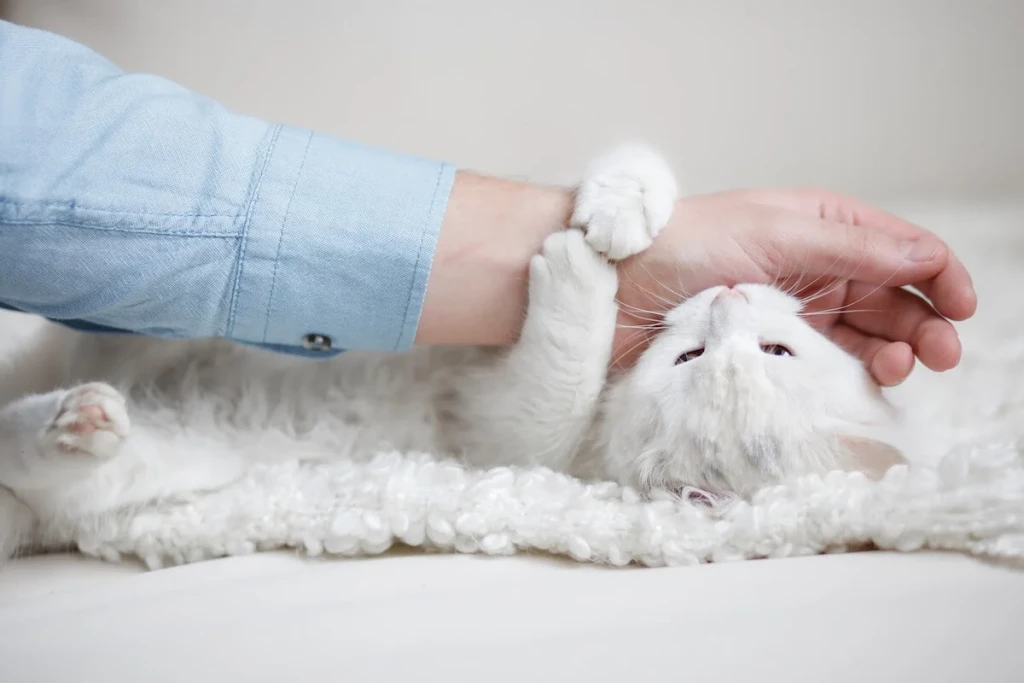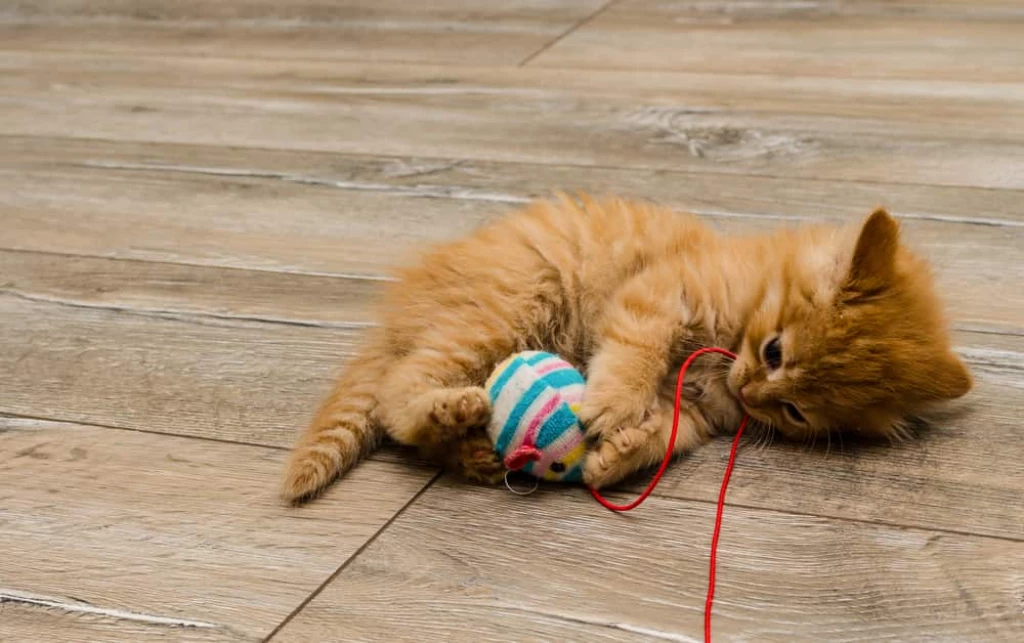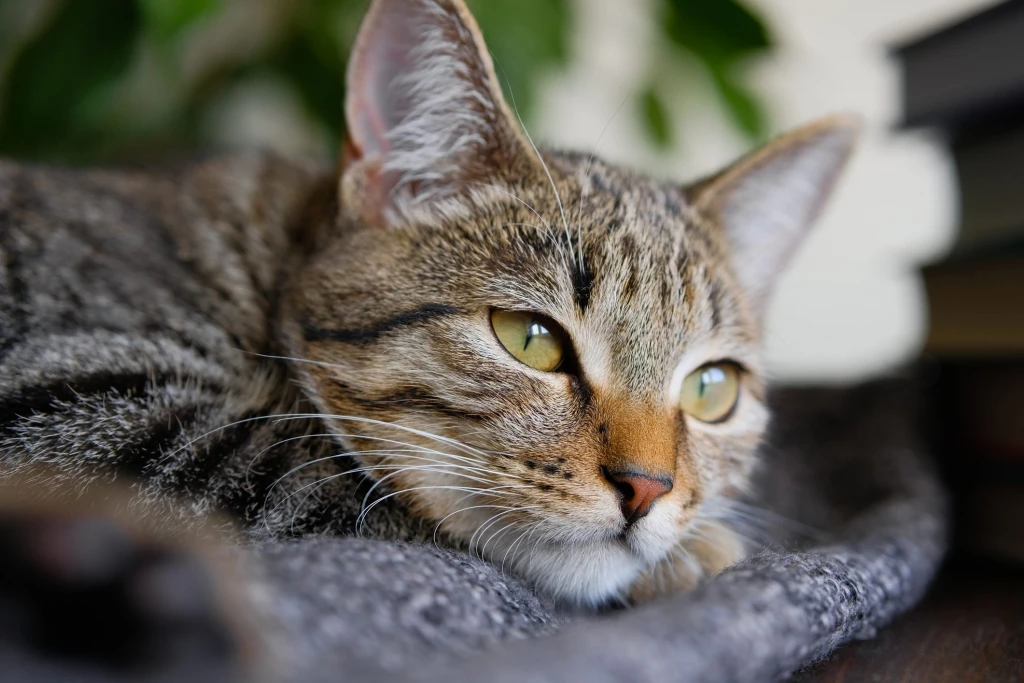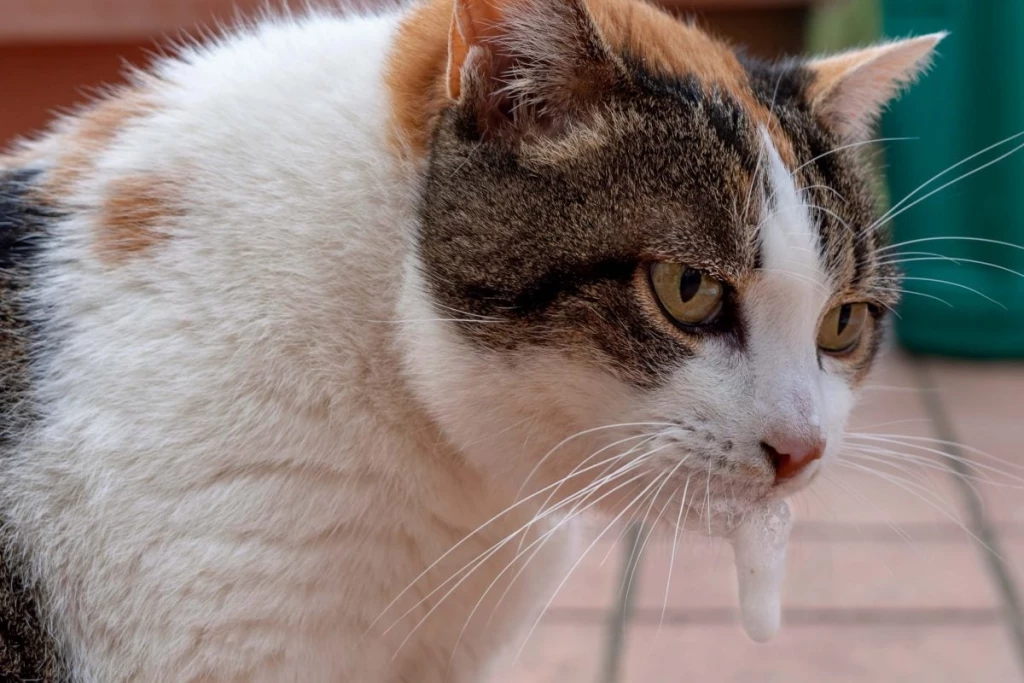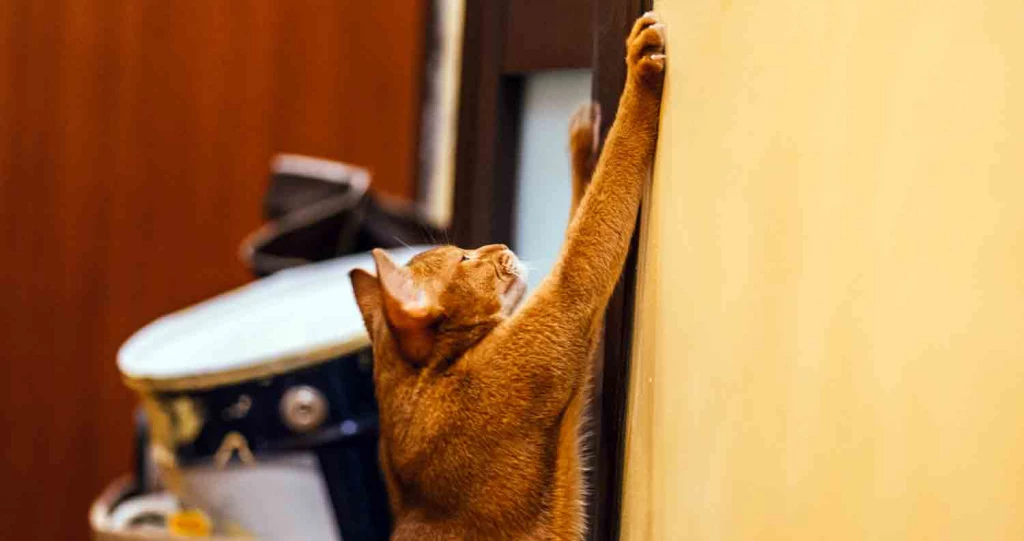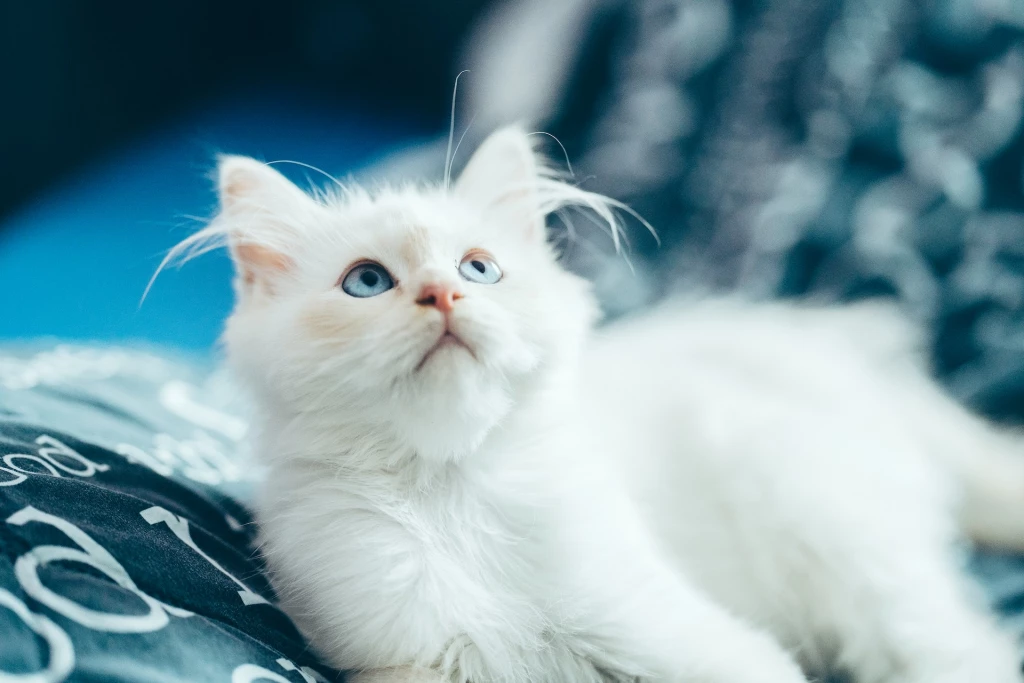Have you ever experienced your cat hugging your arm and then biting you? If so, you may have wondered why they do this. Is it a sign of love or aggression? Is it normal or abnormal? Is it something you should be worried about or not?
The truth is, there is no one definitive answer to this question, as each cat has their own unique personality and behavior. However, there are some common reasons why cats may display this behavior, based on expert opinions or research. In this blog post, we will explore some of these reasons, and provide you with some practical and positive tips on how to prevent or stop your cat from biting you. Whether you are a cat lover or a cat hater, you will find this post informative and interesting. So, let's get started!
Why Do Cats Hug Your Arm and Bite You?
If you have ever experienced your cat hugging your arm and then biting you, you may have wondered why they do this. Is it a sign of love or aggression? Is it normal or abnormal? Is it something you should be worried about or not?
The truth is, there is no one definitive answer to this question, as each cat has their own unique personality and behavior. However, there are some common reasons why cats may display this behavior, based on expert opinions or research. Here are some of them:
- Overstimulation: Cats can become overstimulated when they are petted for too long or in certain areas, such as their belly or tail. This means that they feel too much sensory input and need a break. Biting is their way of telling you to stop, as they may not know how to communicate their discomfort in other ways. To avoid this, you should pay attention to your cat's body language and vocalizations, and stop petting them when they show signs of irritation, such as twitching their tail, flattening their ears, or growling.
- Fear and anxiety: Cats can bite you when they are feeling scared or stressed by something, such as loud noises, unfamiliar people or animals, or pain. This is a defense mechanism that shows that they are trying hard to protect themselves or escape from the situation. Biting is their way of saying "leave me alone", as they may feel threatened or overwhelmed. To avoid this, you should try to identify and eliminate the source of your cat's fear or anxiety, and provide them with a safe and comfortable environment where they can relax and feel secure.
- Communication: Cats use body language and vocalizations to communicate with you, and biting is one of their ways of expressing their needs or feelings. For example, a cat may bite you when they are hungry, thirsty, need to use the litter box, don't like being petted right now, or are in pain. Biting is their way of saying "pay attention to me", as they may not know how to get your attention in other ways. To avoid this, you should try to understand what your cat is trying to tell you when they bite you, and respond accordingly. You should also teach your cat other ways of communicating with you, such as using a bell or a scratching post.
- Territory: Cats are very territorial creatures, and biting is one of their ways of marking their space or warning you to back off. For example, a cat may bite you when they feel like you are invading their personal space, moving their things around too much, or touching them when they are sleeping. Biting is their way of saying "this is mine", as they may feel insecure or possessive. To avoid this, you should give your cat plenty of space and their own things, such as a bed, food and water bowls, toys, etc. You should also respect their boundaries and not disturb them when they are resting or grooming.
- Affection: Cats can bite you as a gesture of love and trust, and it's a compliment rather than an insult. For example, a cat may bite you when they are feeling happy and relaxed with you, want to play with you, or want to groom you. Biting is their way of saying "I love you", as they may see you as part of their family or social group. To avoid this, you should appreciate your cat's affection and reciprocate it in a gentle and calm way. You should also teach your cat how to be gentle with their teeth and claws, and reward them with praise or treats when they are.
As you can see, there are many reasons why cats hug your arm and bite you, and most of them are not malicious or harmful. However, if your cat's biting behavior becomes excessive or aggressive, or if it causes injury or infection to you or others, you should consult with a veterinarian or a behaviorist to rule out any underlying health issues and to help you address your cat's behavior in a positive and effective way.
How to Prevent or Stop Your Cat From Biting You?
If your cat hugs your arm and bites you, you may wonder how you can prevent or stop this behavior. While biting is a natural and normal behavior for cats, it can also be annoying and painful for you and others. Fortunately, there are some practical and positive ways you can deal with your cat's biting behavior, based on expert opinions or research. Here are some of them:
- Know your cat: One of the best ways to prevent or stop your cat from biting you is to know your cat's personality and preferences. Each cat has their own likes and dislikes, and their own ways of communicating with you. By learning what your cat enjoys and what they don't, you can avoid triggering their biting instinct and respect their signals. For example, some cats love to be petted on their head or chin, while others prefer their back or sides. Some cats like to play rough, while others like to play gently. Some cats like to cuddle, while others like to keep their distance. By observing your cat's body language and vocalizations, you can understand what they are telling you and respond accordingly.
- Pet your cat in the right places: Another way to prevent or stop your cat from biting you is to pet your cat in the right places. Some cats don't like to be touched in certain areas, such as their belly or tail, and they may bite you if you touch those spots. To avoid this, you should find out where your cat likes to be petted, and do it gently and slowly. You should also pay attention to your cat's reactions, and stop petting them when they show signs of irritation, such as twitching their tail, flattening their ears, or growling. You should also avoid petting your cat when they are sleeping or grooming, as they may see it as an intrusion and bite you.
- Avoid provoking your cat: Another way to prevent or stop your cat from biting you is to avoid provoking your cat. Some actions or situations can trigger your cat's biting instinct, such as playing rough, moving their things around too much, or touching them when they are not in the mood. To avoid this, you should play with your cat in a safe and fun way, using toys that mimic their natural prey, such as feathers or mice. You should also give your cat plenty of space and their own things, such as a bed, food and water bowls, toys, etc. You should also respect their boundaries and not disturb them when they are resting or grooming.
- Play with your cat: Another way to prevent or stop your cat from biting you is to play with your cat. Playing with your cat can help them release their energy and frustration, and reduce their boredom and stress. This can make them less likely to bite you out of aggression or anxiety. To play with your cat effectively, you should choose the right toys for your cat, such as ones that stimulate their natural hunting instincts, such as feathers or mice. You should also engage them in interactive games that challenge their physical and mental abilities, such as hide and seek or fetch. You should also vary the toys and games you use to keep your cat interested and excited.
- Act like you're hurt: Another way to prevent or stop your cat from biting you is to act like you're hurt when they bite you. Acting like you're hurt can help them learn that biting is not acceptable and that it hurts you. To do this effectively, you should make a loud noise, such as saying "ow" or "no", or withdrawing your hand when they bite you. You should also avoid rewarding them for biting you, such as giving them attention, food, or toys. Instead, you should reinforce positive behavior from them, such as praising them, petting them, or giving them treats when they are gentle and calm. This can help them associate being nice with getting rewards, and being mean with getting ignored. You should also be consistent and patient with this method, as it may take some time for your cat to learn and change their behavior.
Conclusion
In this blog post, we have learned why cats hug your arm and bite you, and how you can prevent or stop this behavior. We have seen that cats may bite you for various reasons, such as overstimulation, fear and anxiety, communication, territory, or affection. We have also seen that biting is a natural and normal behavior for cats, but it can also be annoying and painful for you and others. Therefore, we have provided you with some practical and positive tips on how to deal with your cat's biting behavior, such as knowing your cat, petting your cat in the right places, avoiding provoking your cat, playing with your cat, and acting like you're hurt.
We hope that this blog post has helped you understand your cat better, and improve your relationship with them. Remember that cats are wonderful and complex creatures, and they deserve our love and respect. By following these tips, you can enjoy your cat's cuddles without getting hurt. Thank you for reading this blog post, and have a great day!
